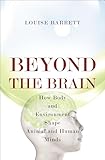Beyond the Brain : How Body and Environment Shape Animal and Human Minds / Louise Barrett.
Material type: TextPublisher: Princeton, NJ : Princeton University Press, [2011]Copyright date: ©2011Description: 1 online resource (288 p.) : 14 line illusContent type:
TextPublisher: Princeton, NJ : Princeton University Press, [2011]Copyright date: ©2011Description: 1 online resource (288 p.) : 14 line illusContent type: - 9780691126449
- 9781400838349
- online - DeGruyter
- Issued also in print.
| Item type | Current library | Call number | URL | Status | Notes | Barcode | |
|---|---|---|---|---|---|---|---|
 eBook
eBook
|
Biblioteca "Angelicum" Pont. Univ. S.Tommaso d'Aquino Nuvola online | online - DeGruyter (Browse shelf(Opens below)) | Online access | Not for loan (Accesso limitato) | Accesso per gli utenti autorizzati / Access for authorized users | (dgr)9781400838349 |
Browsing Biblioteca "Angelicum" Pont. Univ. S.Tommaso d'Aquino shelves, Shelving location: Nuvola online Close shelf browser (Hides shelf browser)

|

|

|

|

|

|

|
||
| online - DeGruyter New Impressions of Africa / | online - DeGruyter At Lake Scugog : Poems / | online - DeGruyter Carnations : Poems / | online - DeGruyter Beyond the Brain : How Body and Environment Shape Animal and Human Minds / | online - DeGruyter Eco-Republic : What the Ancients Can Teach Us about Ethics, Virtue, and Sustainable Living / | online - DeGruyter Einstein Before Israel : Zionist Icon or Iconoclast? / | online - DeGruyter Kissing Architecture / |
Frontmatter -- CONTENTS -- Acknowledgments -- Chapter 1. Removing Ourselves from the Picture -- Chapter 2. The Anthropomorphic Animal -- Chapter 3. Small Brains, Smart Behavior -- Chapter 4. The Implausible Nature of Portia -- Chapter 5. When Do You Need a Big Brain? -- Chapter 6. The Ecology of Psychology -- Chapter 7. Metaphorical Mind Fields -- Chapter 8. There Is No Such Thing as a Naked Brain -- Chapter 9. World in Action -- Chapter 10. Babies and Bodies -- Chapter 11. Wider than the Sky -- Epilogue -- Notes -- References -- Index
restricted access online access with authorization star
http://purl.org/coar/access_right/c_16ec
When a chimpanzee stockpiles rocks as weapons or when a frog sends out mating calls, we might easily assume these animals know their own motivations--that they use the same psychological mechanisms that we do. But as Beyond the Brain indicates, this is a dangerous assumption because animals have different evolutionary trajectories, ecological niches, and physical attributes. How do these differences influence animal thinking and behavior? Removing our human-centered spectacles, Louise Barrett investigates the mind and brain and offers an alternative approach for understanding animal and human cognition. Drawing on examples from animal behavior, comparative psychology, robotics, artificial life, developmental psychology, and cognitive science, Barrett provides remarkable new insights into how animals and humans depend on their bodies and environment--not just their brains--to behave intelligently. Barrett begins with an overview of human cognitive adaptations and how these color our views of other species, brains, and minds. Considering when it is worth having a big brain--or indeed having a brain at all--she investigates exactly what brains are good at. Showing that the brain's evolutionary function guides action in the world, she looks at how physical structure contributes to cognitive processes, and she demonstrates how these processes employ materials and resources in specific environments. Arguing that thinking and behavior constitute a property of the whole organism, not just the brain, Beyond the Brain illustrates how the body, brain, and cognition are tied to the wider world.
Issued also in print.
Mode of access: Internet via World Wide Web.
In English.
Description based on online resource; title from PDF title page (publisher's Web site, viewed 30. Aug 2021)


